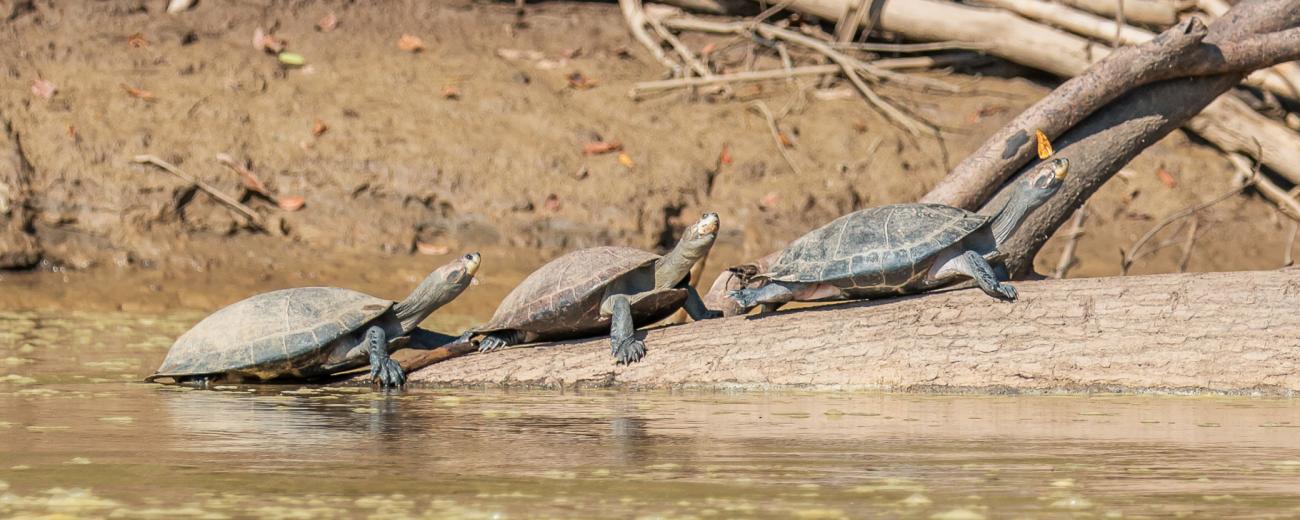It is Amazon Wildlife Peru’s goal to help our national and international guests to get to know, understand and appreciate the amazing Manu rainforest. We hope visitors will become aware of the need of for protection and conservation of this unique forest and all natural places on earth. With this in mind, we would like to share with you our recommendations about how to cause produce as little environmental impact as possible on the Manu National Park during your visit.
Protection for the Forest:
- No animal or plant species can be taken from the forest. Use of machetes to cut vegetation is limited to our tour- or lodge staff and under strict regulations.
- Walking is limited to the existing trails.
- Animals cannot be handled to avoid stress and protect them from insect-repellent contamination.
- Fishing is not allowed in Manu’s Reserved Zone: the hooks may be bitten off by piranhas.
- The piranhas are eaten by giant otters, which will then have the hook in their stomach, causing them considerable harm. Take waterproof cameras or underwater video cameras in order to see piranhas.
- During our walk in the jungle, we really want to minimize visual impact for wildlife, people use to dress up colorful clotting, we advise to dress dark color clotting.
Carbon-Dioxide Emission:
- Plant a tree! To help offset the carbon-dioxide emissions e.g. caused by the airplane that has brought you to Peru, why not plant trees?
- Minimize fuel emissions. Often the bus and boat used for your transportation will also transport food or materials for Amazon Wildlife Peru´s eco-lodges. We ask you for your consideration of this as we may be able to comprehension; as in this way, we can reduce the number of trips our bus and boats make, thereby reducing carbon-dioxide emissions from the motors.
- Our eco-lodges have recently installed a new solar panel system that reduces pollution in Manu and can be are e.g. used to recharge your (camera) batteries for example. Make sure you recharge as little as possible and coordinate with the guide, so that the other members of your group can recharge their batteries at the same day. The solar power will therefore minimize fuel emissions from the generators and also noise contamination in the rainforest!
Garbage Disposal:
- All garbage has to be taken out of the rainforest. Never leave any garbage on the trails or around the eco-lodges. Use Amazon Wildlife Peru´s garbage bags for disposal.
- Respect our rules for disposal of garbage in bags for biodegradable and non-biodegradable garbage.
- Vegetable and fruit waste cannot be thrown in the river or forest. Even though these may compose quite fast, in the mean time they are a visual contamination for other visitors and might change the biodiversity. The peels may also contain chemicals such as insecticides and preservatives.
- Use biodegradable soap and shampoo. If not available, use your non-biodegradable products as little as possible.
- If you smoke, make sure you pick up all your cigarette butts. These take a very long time to decay, contaminate the whole area or water and, if eaten before that, can be a health hazard to the animals.
- Avoid using plastics that only have a short term use. If plastic is necessary, like plastic bags to keep your clothes dry in for example, try to buy bags that can be used again, either by you or the next tourist. If possible, don’t buy any drinks in plastic bottles, opting instead for glass bottles. If buying plastic bottles cannot be avoided, make sure the bottles are will be returned to Cusco and recycled (put throw them in the garbage bag for non-biodegradable garbage during your trip with Amazon Wildlife Peru).
Contact with local people:
- Respect customs and habits of local people. Do not impose your actions upon them without having their explicit permission. For example, taking pictures unasked or entering their houses without permission (even though they look open and inviting) may cause distress.
- Buying local products helps the local people to have a monetary income. Make sure you pay a fair price!
- Never purchase any animals or plants, or products made of them.
Thank you for respecting all these is issues…!!!
Enjoy your trip!!!!!!


